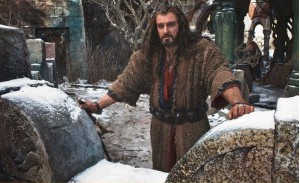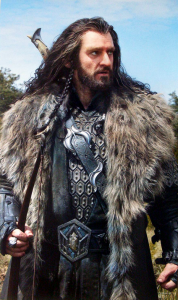 We’re into the semi-final match-ups in our 2014 Middle-earth March Madness contest. As part of it, I thought it apt to examine each of our four finalists in turn, starting with our questing Dwarf, Thorin Oakenshield.
We’re into the semi-final match-ups in our 2014 Middle-earth March Madness contest. As part of it, I thought it apt to examine each of our four finalists in turn, starting with our questing Dwarf, Thorin Oakenshield.
In this piece, published a while back over on the site of our friends Heirs of Durin, DarkJackal asserts that Thorin unjustly gets a bad rap from readers of The Hobbit for events following the death of Smaug, and that there’s more to his motivations than meet the eye.
Don’t forget to click the link at the bottom to continue to the full essay.
In Defense of Thorin Oakenshield
A Journey from Hero to Villain, and Back Again
by DarkJackal
Thorin is often criticized for the choices he makes after the death of Smaug, and the average reader is rarely sympathetic with his refusal to share the treasure with the people of Lake-town. But when I read the story, I find it hard not to side with him. This essay is an attempt to justify my reaction. [Note: This is based on my reactions to the original Hobbit story only, without factoring in the material from the Appendices, Unfinished Tales, or the film.]
While he is never entirely a villain, Thorin Oakenshield becomes temporarily cast as one due to circumstance. From the beginning, the character possesses a strong sense of self-importance, and a gruff impatience which is not entirely endearing. By the time the dragon has been destroyed, it is already clear he is an inconsistent hero, occasionally brave and heedless of danger, but just as often shirking the riskiest activities, and letting a small hobbit face them. After the Lonely Mountain is reclaimed, his character becomes even less appealing.
Because of pride, and an unwillingness to bend to the will of outsiders, he commits his followers to a desperate battle. At one point, even Gandalf stands against him. Given the wizard’s status, readers know the dwarf must be doing something wrong if he has earned this stamp of disapproval. What appears to be a flaw in his character culminates in a deadly rage against Bilbo. But exactly how did the exiled king shift from protagonist to antagonist?
 To answer this question, it is first important to note that although Bilbo may be the main character, it is actually the lesser protagonists who move the plot along. The quest is organized by Gandalf (who has his own hidden motives), while the journey is driven forward by Thorin’s desire to reclaim his kingdom. Bilbo goes along for the ride, partly to live up to Gandalf’s recommendation of him as a burglar, but mostly because he is seeking something intangible; a connection to his ancestors via a discovery of his more adventurous self.
To answer this question, it is first important to note that although Bilbo may be the main character, it is actually the lesser protagonists who move the plot along. The quest is organized by Gandalf (who has his own hidden motives), while the journey is driven forward by Thorin’s desire to reclaim his kingdom. Bilbo goes along for the ride, partly to live up to Gandalf’s recommendation of him as a burglar, but mostly because he is seeking something intangible; a connection to his ancestors via a discovery of his more adventurous self.
Thorin is guided even more strongly by ancestral expectations, but his goals are very tangible. He wants the Lonely Mountain, the horde of treasure that lies within it, and the heirloom Arkenstone, as well as the restoration of his people to their rightful home. A keen sense of pride is linked to each of these goals, and we find out he is unwilling to settle for anything less than achieving all of them.
To say Bilbo is the hero of the tale, and Smaug the villain, oversimplifies matters. Bilbo is not initially possessed of heroic qualities, but bravery and self-sacrifice come to him over the course of the book. There are many antagonists that serve as foils to Bilbo. Practically everything harries the hobbit, including trolls, goblins, Gollum, wargs, and spiders.
After having bested these opponents, Bilbo must face the dragon. His own triumph over fear (manifested in their face-to-face conversation) is more important to his character’s growth than the actual slaying of the beast, and it is left to Bard, a more traditional human hero, to stand before the villain. But although Bilbo is not directly responsible for Smaug’s demise, his discovery of the dragon’s weakness (passed along to Bard by the thrush bird) plays an important part.


